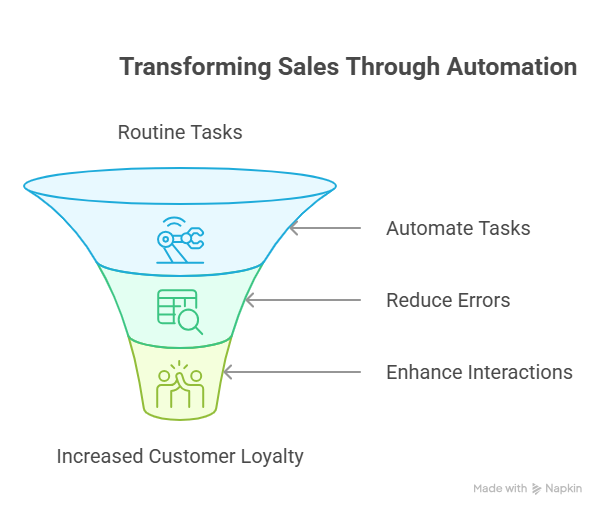Did you know that businesses can increase their sales productivity by up to 30% by implementing automated sales processes? In today’s fast-paced business landscape, staying ahead of the competition requires leveraging the right technology. By automating routine tasks, sales teams can focus on what matters most – closing deals and driving revenue growth.
This article will explore the world of sales automation tools, providing insights into how you can streamline your sales workflow, enhance efficiency, and ultimately boost your bottom line. By the end of this article, you’ll have a clear understanding of how to leverage these powerful tools to transform your sales process.
Why Sales Automation Matters for Modern Businesses
Sales automation is no longer a luxury, but a necessity for modern businesses aiming to maximize their sales potential and efficiency. The sales landscape has undergone significant changes over the years, driven by advances in technology and shifting customer expectations.
The Evolution of Sales Processes
The way businesses sell has transformed dramatically. Traditional sales methods are being replaced by more sophisticated, technology-driven approaches. CRM software and customer relationship management software have played a crucial role in this evolution, enabling sales teams to manage leads, track interactions, and analyze customer data more effectively.
The sales process has become more complex, with buyers expecting personalized experiences and timely responses. To meet these expectations, businesses are adopting sales automation tools to streamline their workflows and improve productivity.
Key Benefits of Automating Your Sales Workflow
Automating your sales workflow can bring numerous benefits, including increased efficiency, improved accuracy, and enhanced customer satisfaction. By leveraging sales productivity tools, businesses can:
- Reduce manual tasks and minimize the risk of human error
- Gain real-time insights into customer behavior and preferences
- Personalize customer interactions and improve engagement
- Accelerate the sales cycle and close deals faster
The following table highlights some of the key benefits of sales automation and how they impact business outcomes:
| Benefit | Description | Impact |
|---|---|---|
| Increased Efficiency | Automating routine tasks | More time for strategic selling |
| Improved Accuracy | Reducing manual data entry | Fewer errors and better data quality |
| Enhanced Customer Satisfaction | Personalized interactions and timely responses | Increased customer loyalty and retention |

By embracing sales automation, businesses can stay competitive, drive revenue growth, and achieve their sales goals more effectively.
Top Sales Automation Tools for Streamlining Your Pipeline
To stay competitive, businesses need to leverage the power of sales automation tools, which come in various forms to suit different needs. With so many options available, it’s essential to understand the different categories of sales automation tools to make informed decisions.
CRM Software: The Foundation of Sales Automation
CRM (Customer Relationship Management) software is the backbone of any sales automation strategy. It helps businesses manage customer interactions, track sales, and analyze data to optimize their sales processes. Popular CRM software includes Salesforce and HubSpot CRM, which offer a range of features such as contact management, sales forecasting, and performance tracking.
Some key benefits of CRM software include:
- Improved customer insights through data analysis
- Enhanced sales forecasting and performance tracking
- Streamlined sales processes through automation
Marketing Automation Platforms That Integrate with Sales
Marketing automation platforms are designed to integrate with sales tools, enabling businesses to automate marketing campaigns and align them with their sales strategies. Marketo and Pardot are examples of marketing automation platforms that offer features such as email marketing, lead scoring, and campaign tracking.
When choosing a marketing automation platform, consider the following:
- Integration capabilities with your existing CRM and sales tools
- Customization options for marketing campaigns and lead scoring
- Analytics and reporting features to measure campaign effectiveness
Lead Management and Sales Funnel Software
Lead management and sales funnel software are critical for optimizing the sales process. Tools like LeadIQ and Unbounce help businesses capture, qualify, and nurture leads, ensuring that they are passed to the sales team at the right time.
Key features of lead management and sales funnel software include:
- Lead capture and qualification forms
- Lead nurturing campaigns through email and content
- Sales funnel visualization and optimization
Revenue Acceleration and Sales Enablement Solutions
Revenue acceleration and sales enablement solutions are designed to enhance sales performance and drive revenue growth. Platforms like Gong.io and Showpad offer features such as sales analytics, content management, and sales enablement training.
When implementing revenue acceleration and sales enablement solutions, focus on:
- Analyzing sales data to identify areas for improvement
- Providing sales teams with relevant content and training
- Monitoring sales performance and adjusting strategies accordingly
Implementing Sales Automation Tools in Your Business
Effective implementation of sales automation tools requires a deep understanding of your sales process. It’s about identifying areas where automation can add value, streamline operations, and enhance customer engagement. By leveraging the right tools, businesses can significantly improve their sales efficiency and revenue generation.
Developing Your Automation Strategy
To develop a successful automation strategy, start by mapping out your current sales process. Identify bottlenecks, repetitive tasks, and areas where human intervention is not crucial. Consider implementing sales enablement software to enhance content delivery, analytics, and customer engagement.
Next, define your goals and objectives. Are you looking to increase lead conversion rates, reduce sales cycles, or improve customer retention? Establishing clear goals will help you choose the right revenue acceleration tools and measure their effectiveness.
Integration and Team Adoption Tips
Successful integration of sales automation tools requires careful planning. Start by selecting tools that integrate well with your existing CRM and other sales systems. Provide comprehensive training to your sales team to ensure they understand the benefits and usage of the new tools.
- Develop a phased implementation plan to minimize disruption.
- Monitor progress and adjust the strategy as needed.
- Encourage feedback from the sales team to identify areas for improvement.
Measuring Success and ROI
To measure the success of your sales automation efforts, track key performance indicators (KPIs) such as conversion rates, sales cycle length, and customer satisfaction. Use analytics tools to gain insights into your sales process and identify areas for further optimization.
| KPI | Pre-Automation | Post-Automation |
|---|---|---|
| Conversion Rate | 20% | 30% |
| Sales Cycle Length | 60 days | 45 days |
| Customer Satisfaction | 80% | 90% |
By carefully planning and executing your sales automation strategy, you can achieve significant improvements in efficiency, customer satisfaction, and ultimately, revenue growth.
Conclusion: Transforming Your Sales Process Through Automation
Automating your sales process can have a transformative impact on your business, enabling you to work more efficiently, close more deals, and drive revenue growth. By leveraging powerful sales automation tools, you’ll be well on your way to streamlining your sales workflow and achieving your sales goals.
As you continue on your sales automation journey, stay focused on your objectives and continually evaluate and refine your strategy. This will help you identify new opportunities to innovate and improve, ultimately driving long-term success.
Effective sales automation tools can help you simplify complex sales processes, reduce manual errors, and enhance customer engagement. By integrating these tools into your sales workflow, you can maximize efficiency and drive revenue growth.
FAQ
What are sales automation tools, and how can they benefit my business?
Sales automation tools are software solutions designed to streamline and automate repetitive sales tasks, freeing up more time for sales teams to focus on high-value activities. By leveraging these tools, businesses can increase sales productivity, improve efficiency, and drive revenue growth.
How do I choose the right CRM software for my sales automation needs?
When selecting a CRM software, consider factors such as your business size, sales process complexity, and integration requirements. Look for a CRM that offers robust automation features, such as lead scoring, workflow automation, and sales forecasting, as well as seamless integration with other sales automation tools.
Can marketing automation platforms integrate with my sales automation tools?
Yes, many marketing automation platforms are designed to integrate with sales automation tools, enabling businesses to align their marketing and sales efforts. By integrating these platforms, businesses can create a seamless customer journey, from lead generation to conversion.
How do I measure the success of my sales automation efforts?
To measure the success of your sales automation efforts, track key performance indicators (KPIs) such as sales productivity, conversion rates, and revenue growth. Use data and analytics to evaluate the effectiveness of your sales automation tools and make data-driven decisions to drive further growth.
What is the role of lead management and sales funnel software in sales automation?
Lead management and sales funnel software play a critical role in sales automation, enabling businesses to capture, qualify, and nurture leads, and guide them through the sales process. By leveraging these tools, businesses can improve lead conversion rates and drive revenue growth.
How can sales enablement solutions support my sales automation strategy?
Sales enablement solutions provide sales teams with the content, training, and insights they need to engage with customers effectively and close deals. By integrating sales enablement solutions with sales automation tools, businesses can create a powerful sales engine that drives revenue growth and customer satisfaction.
What are revenue acceleration tools, and how can they benefit my business?
Revenue acceleration tools are designed to help businesses accelerate their sales cycles, improve conversion rates, and drive revenue growth. By leveraging these tools, businesses can gain a competitive edge, improve sales productivity, and achieve their revenue goals.

